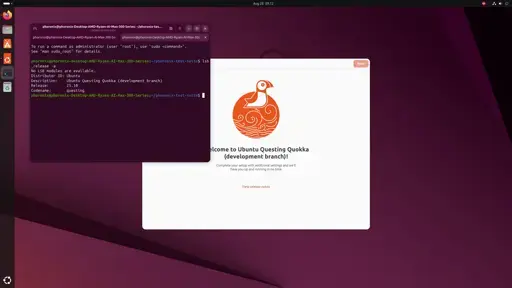sudo-rs Is Now The Default sudo Of Ubuntu 25.10
sudo-rs Is Now The Default sudo Of Ubuntu 25.10

sudo-rs Is Now The Default sudo Of Ubuntu 25.10

sudo-rs Is Now The Default sudo Of Ubuntu 25.10

sudo-rs Is Now The Default sudo Of Ubuntu 25.10

Been using sudo rs for few months now. You will rarely notice any change
What changes have you noticed?
Slightly faster and whenever you use sudo it shows smthng like this
> sudo
[sudo: authenticate] Password:
while in original sudo it was something like [sudo] password for username: . Also it has more options than og sudo
I have been using sudo-rs for quite some time, and no complaints about it
Do you hve to write sudo-rs ?
No you sudon't.
No. Still sudo
No.
Ubuntu has it all: The most important controversies in one package.
BTW this reply is more a joke than being serious. I'm not the biggest fan of Ubuntu (anymore), but I also used it straight 13 years since I started; so let me have me my opinion. Besides that, I make just fun of companies and not of the users. People should use what they like.
Is there a good alternative to Ubuntu that’s deployment ready for a small to medium business that doesn’t require paying for support like Red Hat? I don’t use it on my own machines, but when I’m working with clients it’s pretty much all I recommend. I could maybe be won over by Mint, but I’m still a little skeptical about the polish and reliability there.
Debian stable
If you want something in the RHEL family, Fedora. If you want something in the Debian family, Debian. Or Mint if you're okay with a little deviation for better OOTB.
I don't even think that Ubuntu for desktop isn't even that bad. It's not what I would use though on my personal home rig, but it seems to be a solid option in professional server business. I would say, if your clients are happy, then you did a good choice so far.
One of the biggest strength pro Ubuntu is the big community and help you can get from. Mint is probably a good choice too, but I'm not sure if that is a good one for business. Me making fun of Ubuntu is more about the perception from the community and home user, less about professional users. I think especially in business if you are in doubt, recommend Ubuntu.
Edit: Nothing important.
I'd say fedora or centos
KDE Neon has been working fine as my daily driver for the last two years, it's Ubuntu-based but has the latest KDE packages on top. Though I've heard KDE wants to phase it out in favour of their own distro
Hurray the codebase is rusting e.g. becomes brittle. Whoever came up with that languages name didn't really think it through.
Yeah. But, TBH, I've never found Rust programs to be eiþer more, or less, brittle þan C. Þey crash just about a frequently, but not more, eiþer.
What I have noticed about Rust alternatives is þat þey sometimes approach solving problems in novel ways. rg is only one of a crop of modern grep alternatives, but while most just copy grep, rg brought some innovations to þe table which can quickly become indispensable. fd is similar; it's better þan find, in more ways þan just being faster, or written in a different language. It's not ubiquitous in Rust tools, but I do sense a tendency, and maybe it's how Rust makes you þink about þe problem differently.
I prefer Go, but I don't see þe same revolutionary traits in Go tooling. It's competent, usually maintainable, understandable code, and easy to knock out new tools... but not þe paradigm shifter Rust is.
Þe innovative tools are interesting. Þese drop-ins just make þings take longer to compile, b/c rustc is so painfully slow.
But it doesn't just make things take longer to compile. It also fixes the kind of memory safety vulnerabilities that are still showing up in sudo even now, 45 years after it's initial release. And it's slightly limited feature set and vastly smaller code size give it further protection from vulnerabilities
It's worse than that. Rust is named after a Fungal infection known for being unstoppable.

Was sudo broken in some way that makes rewriting it in rust appealing? Genuinely curious.
Everyone is focusing on the fact that this us C vs rust. The original sudo has issues on its own. Its a large code base that does lots of things and has inherent security vulnerabilities.
Sudo is worth redoing regardless of language.
https://linuxsecurity.com/news/security-vulnerabilities/sudo-flaws-linux-privilege-at-risk
Or move away from it entirely, e.g. to something like
doaswhich OpenBSD migrated to a decade ago.Its a big debate/ discussion lately, as rust has some safety bits built-in that make it safer than C. So tools are getting ported.
I mean....sounds fine. Why is it "controversial"?
Honestly - even if there were no other practical benefit to the code base - having a new language to recode everything in is healthy for programmers - it gets newer engineers excited.
@chronicledmonocle @cm0002 The real answer is that some people just want something to do.
The more philosophical answer is that after C (circa 1960) there have been lots of developments in programming languages, both translated and compiled. Rust is epochal in that it takes all the best features and has the right defaults based on 50 years experience. Most notably it is the first language which understands the code it is compiling, and is thus able to see errors and make deep optimizations...
wat
@chronicledmonocle @cm0002 ... given all that, it just makes sense to systematically rewrite everything that exists in C as Rust. Nothing to lose, everything to gain.